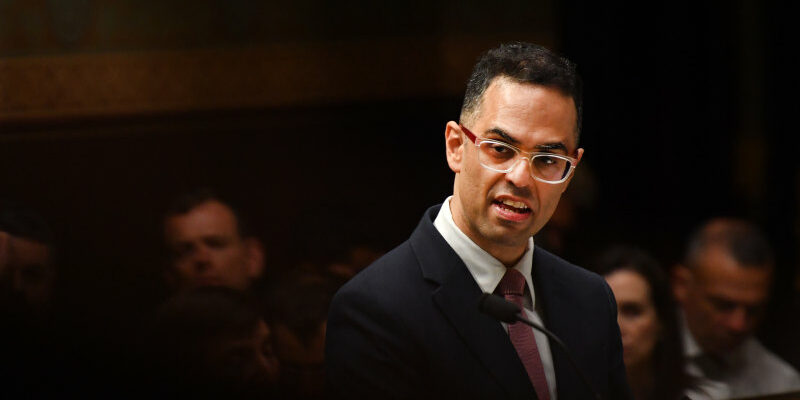Save articles for later
Add articles to your saved list and come back to them any time.
Frustrated by the NSW government’s decision to follow Victoria’s lead in scrapping incentives for people to buy electric cars, one social enterprise has taken matters into its own hands, offering means-tested discounts to new EV buyers.
NSW Treasurer Daniel Mookhey delivers his first state budget.Credit: AAP
In the wake of the NSW budget, which stripped a $3000 subsidy for drivers who buy a new electric vehicle, The Good Car Company is offering a $3000 discount on its cheaper range of EVs to lower income households for the next month.
“It is a pretty stupid business decision, and it should not be us doing it. It shouldn’t be a social enterprise doing this at all, it should be the government,” said Good Car Company co-founder Anthony Broese van Groenou. “But we want it to be a case study on how governments can properly use these incentives.
“The thing to understand is that a $3000 subsidy that gets somebody into an EV will save them thousands of dollars every year. A $3000 subsidy can provide $15,000 worth of benefit over a five-year period, and that is money that totally changes their cost of living.”
One of the reasons given for removing EV subsidies is that they can serve as middle-class welfare, or be exploited by vendors who increase prices.
To circumvent this, the Good Car Company, a social enterprise dedicated to increasing EV uptake and focused on cheap and second-hand models, will offer the full discount to buyers on an income of less than $60,000, and scale it back for higher-income earners.
In Tuesday’s state budget, the NSW government announced it would end rebates and stamp duty exemptions for EVs from January next year, channelling some of the money saved to building fast charging infrastructure.
“The benefits of government spending shouldn’t be concentrated in the hands of the few,” said NSW Treasurer Daniel Mookhey of the decision last week.
Behyad Jafari, chief executive of the Electric Vehicle Council, described the decision to replace the mooted road-user charge with a stamp duty as “particularly egregious”.
“The NSW Treasury is unique around the world in determining that EV rebates don’t work and push up prices. They somehow know better than every other country that deploys rebates to great effect, and despite sales having increased by 450 percent since the rebates were introduced.”
He said he did not believe people who supported this government expected it to scrap support for EVs while planning to prop up coal-fired power stations.
“To kick off your first budget by cutting the best EV policy in the country sends a pretty strong message about priorities. It seems like there wasn’t a climate champion sitting at the cabinet table prepared to push back against the Treasurer’s cuts,” he said.
According to the EV Council’s annual State of EVs report, in the year to July this year 46,624 EVs were sold, accounting for around 8.1 per cent of the market. This was a 121 per cent increase on the previous year.
In that report, the EVC gave NSW, along with the ACT, a nine out of 10 score for EV policy. Asked what he would rank them now, Jafari said it would probably be about five, in line with Victoria.
That is not just because of the policy itself, said, Jafari, but due to the uncertainty and disruption caused changing existing policy.
Get to the heart of what’s happening with climate change and the environment. Sign up for our fortnightly Environment newsletter.
Most Viewed in Environment
From our partners
Source: Read Full Article

